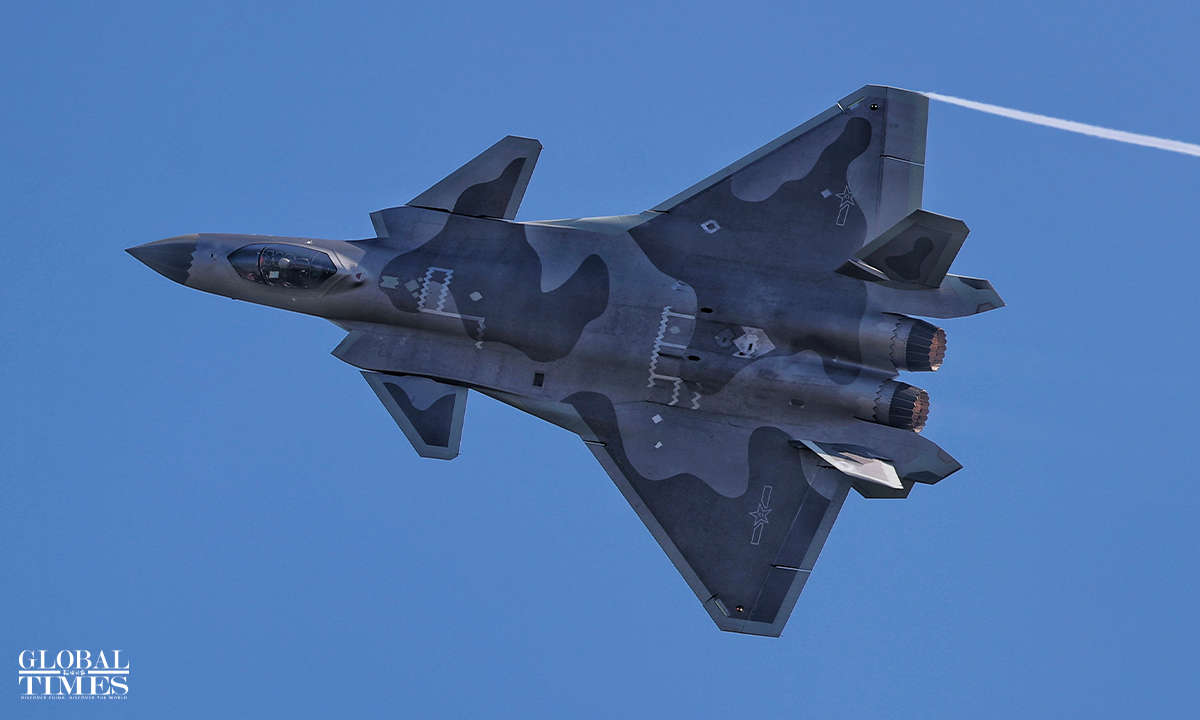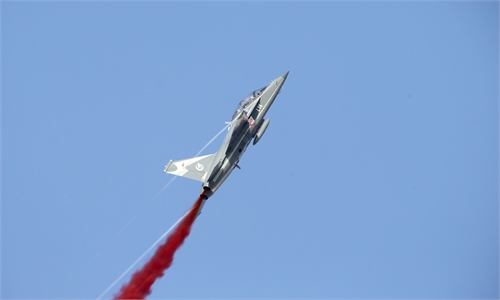China's 2023 defense budget to rise by 7.2%, a 'reasonable, restrained' increase amid global security tensions
Military expenditure boost reasonable, restrained amid global security tensions: experts

China's Defense Budget 2019-2023. Graphic:Global Times
China on Sunday announced a draft budget for 2023 which will see the country's annual defense budget rise to 1.5537 trillion yuan ($224.79 billion), an increase of 7.2 percent,remaining single-digit for the 8th consecutive year. Analysts said that the figure marks a reasonable and restrained boost amid military spending sprees by many other countries around the world in light of global security tensions.
It is part of the country's efforts to meet the need of modernizing its national defense in order to safeguard national sovereignty, territorial integrity and development interests facing external threats and instabilities.
The proposed defense budget growth was made public in a draft budget report issued at the opening of the annual session of the National People's Congress (NPC), the country's top legislature, on Sunday.
It marks that China maintains a single-digit growth for defense budget for the eighth consecutive year since 2016, and a steadily increasing pace since the start of the COVID-19 epidemic in 2020. The growth rate was 6.6 percent in 2020, 6.8 percent in 2021 and 7.1 percent in 2022.
Experts said that the defense budget boost is reasonable due to the country's military modernization roadmap, the growing security threats in the world, as well as further optimized COVID-19 policies that encourage economic growth as well as more military diplomatic activities.
A 7.2 percent increase in defense budget means only a 0.1 percentage point higher compared with last year, and it is not high at all taking China's national defense needs and economic development into account, Song Zhongping, a Chinese military expert and TV commentator, told the Global Times on Sunday.
China's GDP growth rate in 2022 was 3 percent, so the defense budget growth is set to be restrained and reasonable, Song said.
China has set its GDP growth target at about 5 percent for 2023, which is significantly higher than the GDP growth rate of 3 percent in 2022, reflecting confidence in a nationwide economic recovery after claiming a decisive victory against the COVID-19 epidemic, and providing a basis for the defense budget increase, analysts said.
China is aiming to achieve the centenary goals of the People's Liberation Army (PLA) by 2027, basically realize the modernization of national defense and the armed forces by 2035, and fully build the armed forces into world-class forces by the mid-21st century, the Xinhua News Agency reported on August 1, 2022, which marks the 95th anniversary of the founding of the PLA.
To meet this roadmap, China needs to gradually increase its defense expenditure over many years as in tandem with the country's economic growth, a Beijing-based military expert told the Global Times on the condition of anonymity.
National defense modernization consists of mainly the development and procurement of new weapons and equipment, the maintaining of a high level of realistic combat-oriented exercises of the troops, as well as the improved welfare to military personnel, the expert said.

A J-20 stealth fighter jet performs during Airshow China 2022 in Zhuhai, South China's Guangdong Province, on November 9, 2022. Photo: Cui Meng/GT
In 2023, the PLA is expected to commission more advanced warplanes including J-20 stealth fighter jets and J-16 multirole fighter jets at a time when legacy J-7 fighter jets are being decommissioned, and conduct sea trials for the country's third aircraft carrier, the electromagnetic catapults-equipped Fujian. It is also expected to hold more realistic combat-oriented drills that consume large amounts of costly live munitions and fuels, according to observers.The significance of national defense modernization has become particularly highlighted due to the deteriorating global security situation over the past year, including the Russia-Ukraine conflict, and the provocative visit of then US house speaker Nancy Pelosi to the island of Taiwan, which led to a series of unprecedented large-scale military exercises encircling the island.
The US and its allies including Japan have been provoking on the Taiwan question and potential military conflicts with China. The US military frequently send aircraft and vessels to conduct close-in reconnaissance on China's doorsteps, sometimes trespassing into Chinese territorial waters in the South China Sea and provocatively transiting the Taiwan Straits, stirring up trouble. Japan officially broke away from its post-WWII defense-only principle in 2022 and has begun to procure offensive missiles including US-made Tomahawks that could reach foreign countries.
The world today is facing challenges unseen in a century. Under the current global security situation, China needs to allocate enough budgets to build a strong military and sufficient training to build up a credible deterrence to prevent conflicts from happening, win them if they take place, and safeguard national sovereignty, security and development interests, analysts said.

Photo: Xinhua
Not in arms raceMany countries around the world are on military spending sprees in 2023, with the US topping the list with $817 billion budget for the Pentagon, more than three times than that of China. Japan planned $51 billion defense budget, which is record-breaking 26.3 percent higher than previous year. India is expected to raise defense budget by 13 percent. Other countries like the UK, France, Germany and Australia are also looking to boost defense spending, according to media reports.
But China is not participating in an arms race with other countries, observers said.
China's defense spending as a share of GDP has remained basically stable for many years, and it is lower than the world average and the increase is appropriate and reasonable, Wang Chao, spokesperson for the first session of the 14th NPC, made the remarks at a press conference on Saturday.
Observers said that China's defense budget has been kept less than 1.5 percent over the recent years, while the world average is 2 percent, not to mention the US' figure that nears 4 percent.
China is fully capable of increasing this figure to 2 percent, but it chose not to significantly hike defense spending and acted in a restrained manner, showing that China's national defense development is proper and reasonable, and the country will not engage in an arms race with anyone on a path of peaceful development, Song said. China follows a national defense strategy that is defensive in nature, he said.
Expressed in US dollars, China's planned defense budget for 2023, $224.79 billion, is even less than 2022's $229 billion, which is another proof that China is not in an arms race with other countries, experts said.




